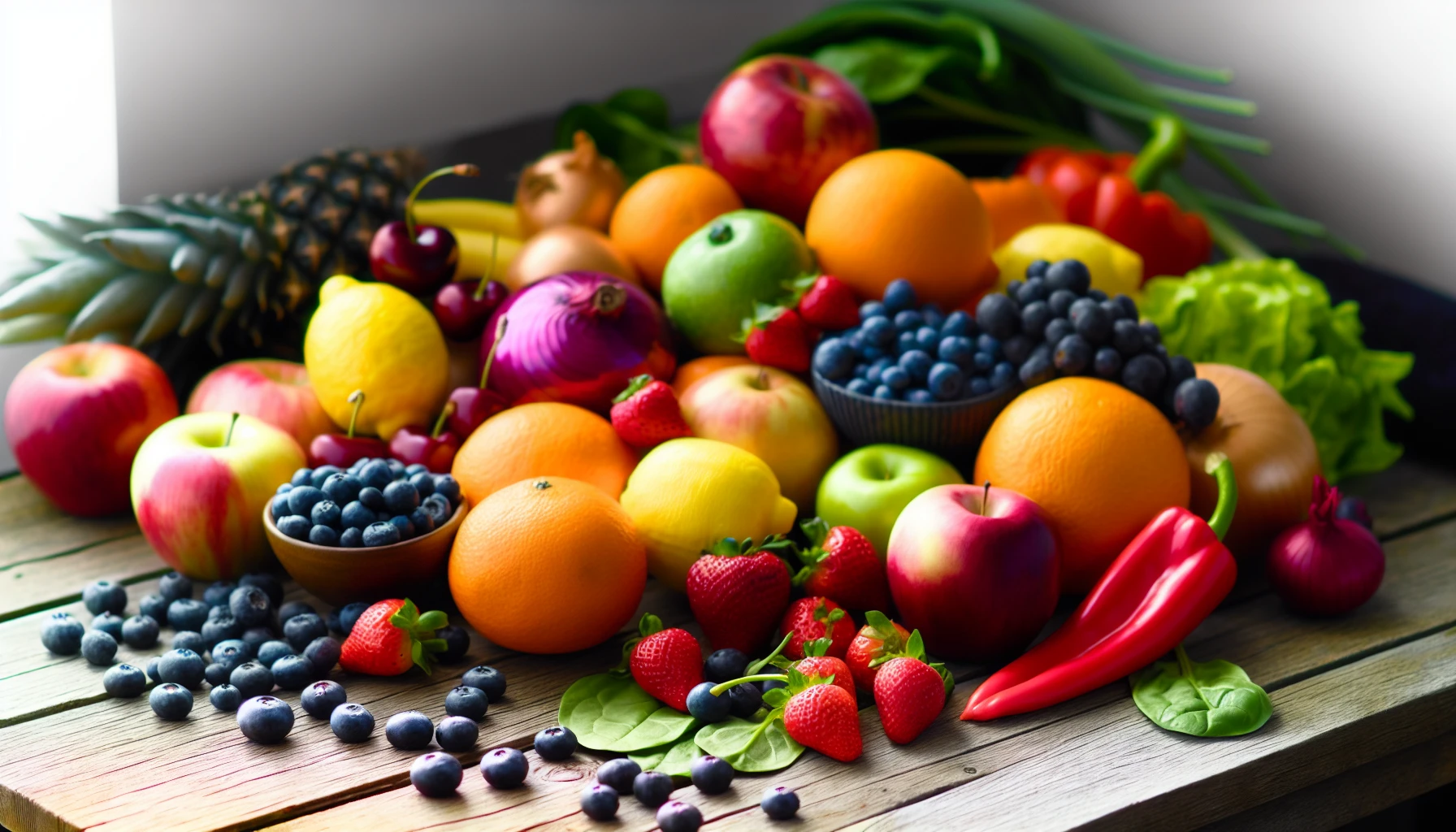Unlock the Power of Flavonoids: The Ultimate Guide to Their Health Benefits
Have you ever wondered what makes fruits and vegetables so vibrant and colorful? The answer lies in the power of flavonoids – naturally occurring plant compounds that not only give plants their vivid hues but also provide numerous health benefits. From supporting cardiovascular wellness to enhancing brain function, flavonoids are truly nature’s unsung heroes. Curious to learn more about these remarkable natural compounds? Let’s embark on a journey to discover the versatile world of flavonoids and their incredible health benefits.
Key Takeaways
Flavonoids are a wide variety of colorful plant-based compounds with numerous health benefits due to their anti-inflammatory, antioxidant and other properties.
Dietary flavonoids can help regulate blood pressure, reduce the risk of heart disease and improve memory & cognitive function.
Flavonoid supplements may be beneficial when dietary intake is insufficient. Topical applications in skincare products also offer skin health benefits.
The Spectrum of Flavonoids: A Colorful Array of Plant-Based Compounds
Behold this dazzling display of fruits and vegetables! Each vibrant hue you see is a visual testament to the diverse range of flavonoids they contain. From the radiant red of strawberries, symbolizing their anthocyanin content, to the sunny yellow of lemons, indicating the presence of flavones, each color tells a story of the flavonoids within. These flavonoids are more than just pigments - they're powerful plant compounds that work wonders for our health. So the next time you're filling your plate, remember: the more colorful your meal, the broader the spectrum of flavonoids you're consuming.
Flavonoids are a varied group of plant-derived molecules found in many fruits, vegetables and other plants that offer numerous health advantages such as antioxidant activity. To increase dietary flavonoid intake one can consume berries, citrus fruits (oranges, lemons), tea or wine, onions and cocoa, all known sources of these compounds. Depending on their chemical structure, they may be categorized into different subclasses like flavones, isoflavones, anthocyanins, and others including flavanols & flavan ones. Scientific research has indicated that these amazing plant substances provide benefit to the cardiovascular system providing antidiabetic effects combat obesity and reduce cancer risk while offering anti inflammatory actions plus notable antioxidant capabilities.
The Vibrant World of Anthocyanins
Fruits and vegetables, such as cranberries, black currants, red grapes, and raspberries. Strawberry and blueberries contain vibrant pigments called anthocyanins which have a number of useful characteristics. These colorful compounds possess anti-inflammatory properties along with the power to function as antioxidants in our bodies - making them an integral part of any health-conscious diet plan. Anthocyanins typically studied include cyanidin delphinidin malvidi peonidan pelargonidin among others also found in bilberry elderberry and various other plant sources.
Flavan-3-ols: Beyond the Ordinary
Flavan-3-ols, a type of flavonoid commonly found in beverages such as tea and cocoa, can act as an antioxidant with potential benefits for those suffering from cardiovascular disease. These compounds – catechin and rutin are two examples, exhibit free radical scavenging effects which may help to protect the heart.
Care should be taken when it comes to ingestion since high intakes could lead to gastrointestinal issues or other undesirable side effects.
Citrus Flavonoids: A Zesty Health Boost
Consuming citrus fruits such as oranges, grapefruits and lemons may bring about numerous health benefits. These fruits contain flavanones – powerful anti-inflammatory compounds that have the ability to scavenge free radicals in our bodies which can help reduce chronic diseases like cancer or heart disease. Flavanone’s strong antioxidant properties also support immune system function and contribute to healthy skin care, brain activity regulation and weight management.
Adding a twist of these zesty treats into your diet is an easy way you can make sure you are receiving sufficient amounts of beneficial nutrients for overall well being!
Dietary Flavonoids and Cardiovascular Wellness
Meet Sarah, a health-conscious woman in her mid-40s. She's been noticing a slight increase in her blood pressure readings lately. Being proactive about her health, she decides to take matters into her own hands. She's seen the statistics, she knows that high blood pressure can lead to serious health issues like heart disease and stroke. Determined to avoid this, she starts to research natural ways to maintain healthy blood pressure levels.
A diet that is rich in flavonoids has been found to promote cardiovascular wellness. Studies have shown an inverse relationship between these dietary compounds and heart or cardiovascular disease, making it important for individuals looking to improve their heart health. Flavonoids are also beneficial as they have been reported to help regulate blood pressure through their antioxidant activity, which helps protect against the development of complications related to cardiovascular diseases.
Consuming a healthy and balanced diet containing adequate amounts of flavonoid-rich foods can be immensely advantageous when it comes to reducing risk factors associated with chronic illnesses such as heart problems or stroke.
Decreased Risk of Cardiovascular Events
Flavonoids have been extensively studied for their role in reducing the risk of cardiovascular events. These naturally occurring compounds, found in abundance in foods like green tea and blueberries, have shown significant potential in lowering the incidence of heart-related ailments. The protective effect of flavonoids is believed to be due to their anti-inflammatory and antioxidant properties, which help to mitigate the damage caused by oxidative stress and inflammation in the cardiovascular system.
Flavonoids as Blood Vessel Protectants
In addition to their role in mitigating cardiovascular risk, flavonoids also act as potent protectants for blood vessels. They enhance the bioavailability of nitric oxide, a molecule that plays a crucial role in maintaining the health and elasticity of blood vessels. By promoting nitric oxide availability, flavonoids help to relax the smooth muscle in vessels, aiding in the prevention of hypertension and other vascular disorders. The protective effect of flavonoids on blood vessels contributes to their overall cardiovascular benefits, making them an essential part of a heart-healthy diet.
Improved Lipid Profile with Flavonoids
Flavonoids also play a significant role in improving lipid profiles. They help regulate levels of cholesterol and other fats in the blood, which is crucial for maintaining cardiovascular health. High levels of LDL cholesterol, or "bad" cholesterol, can lead to the buildup of fatty deposits in the blood vessels, increasing the risk of heart disease and stroke. Flavonoids help to reduce levels of LDL cholesterol and increase levels of HDL cholesterol, or "good" cholesterol, thereby improving overall lipid profiles. This lipid-regulating effect of flavonoids further contributes to their cardiovascular benefits, providing a comprehensive approach to heart health.
Brain Health Flavonoids: Cognitive Guardians
Every morning, Jane starts her day with a warm cup of green tea, a beverage thought to be rich in flavonoids. As she savors the soothing taste of her tea, one assumes that the flavonoids are hard at work. These remarkable plant compounds are known for their health benefits. They contribute to overall well-being, ensuring proper oxygenation, which is essential for optimal health. After a few weeks of her new routine, Jane starts to notice a difference. She feels more alert, finds it easier to focus on her work, and even starts remembering small details she used to forget. Jane's story is a testament to the wonderful benefits of flavonoids, particularly their positive impact on her health.
Flavonoids have a positive effect on brain health by boosting memory and cognitive ability, as well as promoting healthy circulation of blood in the head. Numerous studies suggest that taking flavonoids could help improve memory function, which might potentially reduce one’s risk for developing dementia or Alzheimer’s disease. They contribute to overall cerebral well-being since proper oxygenation is essential for optimal cognition, something flavonoid consumption helps achieve through improved bloodstream flow in the mind.
The Connection Between Flavonoids and Memory
Foods rich in flavonoids have been linked to better memory and cognitive performance. A recent review found that adults over 50 who supplemented their diets with these compounds showed improvements related to mental acuity. This emphasizes the importance of healthy eating for preserving our brain functions as we age. It is estimated that consuming an average amount of 297 milligrams per day may reduce your risk for Alzheimer’s or dementia diagnosis down the line.
Eating foods abundant in flavonoids has thus proven useful in supporting overall cognitive well-being, while possibly reducing risks associated with deteriorating memories conditions such as those mentioned above.
Flavonoids' Influence on Cerebral Circulation
Flavonoid-rich foods, such as green tea and berries like blueberries or grapes, help improve brain function by providing necessary nutrients and oxygen to the brain. Research suggests that cocoa containing flavanols is particularly effective in promoting better blood circulation throughout the cerebrum. This improved blood flow brings valuable benefits to overall mental acuity and cognitive capacity. Thus emphasizing how important it is for us to strive towards optimal neuronal health through flavonoids.
Flavonoids in Cancer Prevention: Nature's Anticancer Agents
Antioxidants play an important role in your health. These natural plant compounds help to neutralize harmful free radicals and also reduce the risk of chronic diseases development. They also support your immune system, keeping your body energized and ready to tackle the day. But there's a catch. To really reap the benefits of these antioxidants, one would need to consume a large amount of berries. It's not just a handful or two. We're talking about bowls and bowls of berries every day. Despite this, don’t get discouraged as every little bit helps.
Flavonoids have been known to display anti-cancer effects, such as decreasing the growth of cancer cells and regulating cell life cycle. Research has suggested that flavonoids can inhibit many types of cancers including hepatoma, cervical carcinoma and breast cancer. Regarding prostate cancer specifically, dark chocolate is thought to be a delicious way to ward off this form of tumor due to its abundance of flavonoids. Studies are being conducted on how much impact it could potentially have in reducing the progression or risk for developing certain forms of malignancies caused by these compounds acting upon metastasizing or dividing cellular structures responsible for cancer onset.
The Impact of Flavonoids on Prostate Cancer
Eating foods high in flavonoids may help reduce the risk of prostate cancer, due to their antioxidant and anti-inflammatory properties. Studies suggest that consuming plant based flavonoids, drinking black tea, or increasing total intake of these nutrients can lead to a decreased likelihood of this type of cancer. Flavonoid’s protective effects could stem from various possible mechanisms for decreasing the chance one would develop it.
Including abundant sources such as beans, fruits & vegetables (rich in flavanols) into your diet has been linked with reducing chances you might get prostate cancer while also improving overall health status.
Flavonoids Found in Dark Chocolate: Delicious Defense
Anticancer drugs, known as flavanols - epicatechin, catechin and procyanidins, which are all found in dark chocolate, can provide a tasty way of defending the body against cancer. These powerful agents have been shown to inhibit cell signaling pathways, attenuate cell growth, and promote programmed cell death, collectively halting cancerous cells’ proliferation while reducing risk levels and protecting from harmful free radicals. Consuming small amounts of this type of cocoa-containing treat may prove beneficial for combating certain types of diseases such as malignant tumours while providing an enjoyable flavonoid rich chocolate snack at the same time!
While flavonoids found in dark chocolate and other foods have shown potential anticancer properties, it's important to understand that they are not a cure-all. The concentration of flavonoids in chocolate and other foods can vary greatly, and consuming these foods alone is unlikely to prevent or cure cancer. It's always best to work with a healthcare professional when dealing with serious conditions like cancer. They can provide guidance on diet and other lifestyle changes that can complement traditional treatments. Remember, while a diet rich in flavonoids can contribute to overall health, it's not a substitute for medical treatment.
Managing Inflammation and Pain with Flavonoids
In a serene setting, a table adorned with an array of herbs became a canvas for nature's beauty. Carefully arranged by knowing hands, basil stood tall with its invigorating scent, while delicate mint leaves added a touch of freshness. Rosemary, an aromatic guardian, flourished alongside vibrant thyme and oregano, creating a tapestry of colors and fragrances. Amidst this herbal symphony, the golden presence of turmeric root quietly made its presence known, adding an earthy essence to the scene. The table, a snapshot of nature's diversity, celebrated the simple yet profound magic found in the everyday herbs. Each herb, a storyteller in its own right, whispered tales of tradition and flavor, creating a timeless tableau of the beauty within a gathering of herbs.
Flavonoids are natural anti-inflammatory agents that can help manage inflammation and pain. They block cellular regulatory proteins to reduce the inflammatory response, as well as interact with various enzyme systems and inhibit arachidonic acid metabolism in order to control chronic discomfort. All of these effects work together against inflammation for greater relief from persistent aches or pains. Ultimately, flavonoids play a key role in managing long term ailments due to their anti-inflammatory properties.
Flavonoids: Natural Anti-Inflammatory Warriors
The anti-inflammatory properties of flavonoids are beneficial in promoting general health and reducing inflammation. These molecules exhibit therapeutic effects as potent antioxidative, analgesic, and anti-inflammatory substances to treat chronic pain and inflammation effectively. Quercetin, myricetin, and fisetin are some examples of these bioactive compounds with strong inflammatory response regulation abilities.
By incorporating these powerful flavonoid sources into your diet, you can help support the natural processes that protect against painful swelling or inflammation within the body’s organs & tissues.
The Role of Flavonoids in Chronic Pain Relief
Human studies have shown that certain flavonoids, can play an important role in easing chronic pain by regulating certain cellular enzyme functions and lessening inflammation. Studies have uncovered that flavonoid compounds, such as naringenin, luteolin or quercetin, are successful in controlling swelling and soreness. These substances possess anti-inflammatory properties. Their activity impacts multiple enzymes responsible for producing inflammatory mediators.
Adding foods with abundant amounts of flavonoids to your meals could help boost your body’s natural capacity to manage both discomfort and inflammation levels.
Flavonoids and Metabolic Health: Regulating Blood Glucose and More
Embark on a journey through the world of diabetes management, where the vibrant hues of fresh vegetables weave a tale of resilience. This image captures the pivotal role of polyphenols in balancing well-being. The meticulous details of a caring medical chart and the unwavering readings of a glucose meter tell the story of how embracing polyphenols can transform the intricate dance of blood glucose levels. A visual ode to the profound value that a polyphenol-rich lifestyle brings to holistic diabetes management.
Flavonoid-rich diets have multiple benefits in regards to lowering blood pressure and glucose regulation. Consumption of flavonoids can improve insulin sensitivity and even decrease the risk of diabetes. Research has shown that these compounds are able to optimize glucose metabolism and control enzymatic activity within the liver, thus resulting in a more efficient management of sugar levels overall. All this demonstrates how beneficial it is for individuals to enjoy a diet high in flavonoids as part of their metabolic health regime, aiding them towards keeping healthy blood sugar concentrations effectively over time.
Flavonoids' Effect on Insulin Sensitivity and Diabetes Risk
Studies have shown that incorporating flavonoids into your daily diet can help reduce the likelihood of developing type 2 diabetes. This is because they possess antioxidant and anti-inflammatory properties, which improve insulin sensitivity by fighting against insulin resistance. Eating foods containing high concentrations of flavonoids has been associated with a decreased risk of contracting this condition. Including these items into one’s regular meals may act as a natural approach to regulating blood sugar levels while decreasing diabetic chances overall.
Diet Rich in Flavonoids: A Strategy for Healthy Blood Sugar
Including a diet abundant in flavonoids can promote healthy blood sugar levels and maintain general metabolic health. Flavonoid rich fruits and foods like bananas, blueberries, peaches, onions and kale are especially beneficial due to their anti-inflammatory properties. Some other options for those looking to reap the full benefits of these powerful antioxidants include: lettuce tomatoes apples grapes dried beans citrus fruits olive oil dark colored berries pumpkin grapefruit carrots bell peppers broccoli red wine tea dark leafy greens. By adding these nutrient dense foods into one’s eating plan they’ll be able unlock access to a host of rewards such as improved regulation of glucose within the bloodstream plus wholesome upkeep regarding overall metabolism that will last over time!
The Synergy of Flavonoids and Other Nutrients
Health benefits can be maximized by combining flavonoids with other antioxidants. These interactions may include Vitamins C and E, carotenoids, folate, Vitamin B6 and B12 or inulin among others, which enable enhanced absorption of nutrient compounds. An efficient way to reap all these positive effects is through a balanced diet rich in dietary sources containing those particular micronutrients that enhance absorption of flavonoid molecules. All together, they would provide many additional health benefits beyond just having one individual component acting on its own as part of any given food source intake.
Enhancing Flavonoid Absorption Through Diet
In order to make the most of health benefits, one should consume a balanced diet including food sources that are rich in flavonoids. Among such foods, tomatoes, pears and strawberries have been found to facilitate their absorption. Bearberries and wheat can also serve as dietary resources for incorporating them into the body’s metabolism. Fats taken along with these elements may Enhance this process too. It is important to note that various cooking techniques can influence how much of the flavonoid intake will be finally absorbed by our organism. Thus many results might depend upon which method we choose when preparing meals enriched with those components necessary for increasing nutritional values.
Complementing Flavonoids with Other Antioxidants
Health benefits can be maximized by including a combination of flavonoids and other antioxidants in the diet. Common additions to this healthful mix include Quercetin, Myricetin, Fisiten, Kaempferol, Silymarin, Rutin, Isorhamnetion Beta-carotene Lycopene, and Lutean Zeaxanthone. All these are found in certain foods like saffron or lettuce, as well as brightly colored fruits and vegetables.
Having an optimal balance between these various components will ensure that your body is receiving all its necessary nutrients for maintaining good health from dietary sources only. This approach encompasses both Flavonoids along with their counterparts when it comes to meeting daily nutritional goals efficiently without extra supplementation on top of already nutrient dense food items available naturally every day diets.
The end result you should aim for is obtaining beneficial effects coming from combining several different kinds of antioxidants into one nutritiously broad meal plan which enables us to benefit not just any single but multiple ‘super ingredients’ ensuring we get maximum essential vitamins while staying within budget at the same time!
Flavonoids: Not Just for Eating
If intake of dietary flavonoids is not enough, consuming them through supplements can be beneficial. Topically applying these compounds also has advantages when it comes to skincare and other applications.
Flavonoid Supplements: When Diet Isn't Enough
When it comes to dietary intake, flavonoid supplements may be advantageous if levels are not met. These benefits range from having antioxidant and anti-inflammatory properties to providing protection against cancer. It’s recommended though that one obtains these compounds through plant food sources as they contain a broad combination of substances working in synergy for health benefits.
For those who opt for this supplement route, utmost care should be taken when deciding on the quality/purity level, dose amounting given bioavailability considerations, formulation preferences and ensuring its safety parameters meet standards too.
Topical Uses of Flavonoids: Skincare and Beyond
The antioxidant properties of flavonoids can be leveraged to benefit the skin, including reducing inflammation and promoting overall health. These compounds are found in many plant extracts and have been commonly used in skincare products such as quercetin, hesperidin, and rutin. Each demonstrating anti-aging capabilities when applied topically. These same topical applications may aid with healing or reproducing healthy skin cells due to their protective effects from ultraviolet rays or other environmental aggressors that harm delicate tissue over time.
Summary
Flavonoids, a powerful set of plant compounds with diverse health benefits such as brain and cardiovascular protection along with anti-inflammatory properties, can be incorporated into our diet through nutrients found in various foods or taken via supplements. Implementing these colorful nature aids into our daily lifestyle is an easy way to improve overall well-being and quality of life.
Frequently Asked Questions
What foods are highest in flavonoids?
Flavonoids are important dietary components found in many nutritious foods, such as tea, wine, fruits and vegetables. Eating these superfoods can be incredibly beneficial to health due to their high concentrations of flavonoid content. In Western societies where the majority of flavonoids come from wine consumption and Eastern cultures rely more heavily on consuming tea for similar benefits. Grains, legumes and nuts also contain significant amounts of this beneficial compound which is why they should be considered when planning a healthy diet packed with flavorful nutrition.
What does flavonoids do for your body?
Flavonoids are known for their strong antioxidant and anti-inflammatory qualities, which can help prevent cancer, boost cardiovascular health, reduce the chances of developing diabetes, and protect the neurological system. Based on this, dietary flavonoid intake can improve human health. These molecules have also been proven in clinical trials to be effective against viral infections while providing protective benefits on a heart level too.
What are bioflavanoids?
Bioflavonoids, also called flavonoids, are a group of polyphenolic secondary metabolites present in plants. These compounds can be located in the peel of green citrus fruits, as well as in rose hips and black currants. Bioflavonoids are commonly utilized in alternative medicine as antioxidants to support blood circulation and a healthy heart, and enhance the action of vitamin C..
Where to find flavonoids?
Flavonoids can be found in a range of plant-based foods, particularly in brightly colored fruits and vegetables. These compounds are also abundant in herbs, spices, teas, chocolate, red wine, beans, whole grains, nuts, and seeds. Foods that are especially rich in flavonoids include onions, leeks, Brussels sprouts, kale, broccoli, tea, berries, beans, and apples.
What foods contain flavonols?
Leafy veggies, apples, onions, broccoli and berries are full of flavonols such as kaempferol, myricetin and quercetin. Eating this is part of a good human diet.
How do flavonoids support cardiovascular health?
Flavonoids are strong antioxidants that may help control high blood pressure and guard against heart disease, thus promoting general cardiovascular health and reduced risk.
Can flavonoids improve brain health and cognitive function?
Flavonoids can enhance brain health and mental performance by increasing memory, fostering healthy blood circulation in the brain, as well as diminishing inflammation. These beneficial compounds offer various advantages to improve cognitive function.
Impact and Side Effects of Flavonoid Supplements: Including Bowel Movement Frequency
Flavonoid supplements can provide concentrated doses of these beneficial compounds, which can be especially helpful for those who struggle to get enough flavonoids through diet alone. However, like any supplement, they can also have side effects when consumed in large amounts. One potential side effect is an increase in the frequency of bowel movements. This can occur because some flavonoid supplements also contain fiber, which helps to regulate the digestive system. Other potential side effects of flavonoid supplements can include gastrointestinal discomfort, headaches, and, in rare cases, allergic reactions. As with any dietary supplement, it's important to use flavonoid supplements responsibly. Always follow the manufacturer's dosing instructions and consult with a healthcare professional before starting any new supplement regimen.
Disclaimer
The information provided in this article is for educational and informational purposes only and is not intended as medical advice. While we strive to provide accurate and up-to-date information, we make no representations or warranties of any kind, express or implied, about the completeness, accuracy, reliability, suitability, or availability with respect to the content. The information contained herein should not be used as a substitute for the advice of an appropriately qualified and licensed physician or other healthcare provider. The suggestions and insights should not be used for diagnosing or treating a health problem or disease, or prescribing any medication. Always seek the advice of your physician or other qualified health provider with any questions you may have regarding a medical condition or treatment and before undertaking a new health care regimen. Never disregard professional medical advice or delay in seeking it because of something you have read on this site.
References By Clinical Area of Interest
General Wellness
Chen X, Mukwaya E, Wong MS, Zhang Y. A systematic review on biological activities of prenylated flavonoids. Pharm Biol. 2014 May;52(5):655-60. doi: 10.3109/13880209.2013.853809. Epub 2013 Nov 21. PMID: 24256182.
Panche AN, Diwan AD, Chandra SR. Flavonoids: an overview. J Nutr Sci. 2016 Dec 29;5:e47. doi: 10.1017/jns.2016.41. PMID: 28620474; PMCID: PMC5465813.
Athletic Performance
Carey CC, Lucey A, Doyle L. Flavonoid Containing Polyphenol Consumption and Recovery from Exercise-Induced Muscle Damage: A Systematic Review and Meta-Analysis. Sports Med. 2021 Jun;51(6):1293-1316. doi: 10.1007/s40279-021-01440-x. Epub 2021 Mar 9. PMID: 33687663.
Joseph DK, Mat Ludin AF, Ibrahim FW, Ahmadazam A, Che Roos NA, Shahar S, Rajab NF. Effects of aerobic exercise and dietary flavonoids on cognition: a systematic review and meta-analysis. Front Physiol. 2023 Aug 16;14:1216948. doi: 10.3389/fphys.2023.1216948. Erratum in: Front Physiol. 2023 Sep 25;14:1287170. PMID: 37664425; PMCID: PMC10468597.
Munguía L, Ortiz M, González C, Portilla A, Meaney E, Villarreal F, Nájera N, Ceballos G. Beneficial Effects of Flavonoids on Skeletal Muscle Health: A Systematic Review and Meta-Analysis. J Med Food. 2022 May;25(5):465-486. doi: 10.1089/jmf.2021.0054. Epub 2022 Apr 8. PMID: 35394826.
Cancer
Bisol Â, de Campos PS, Lamers ML. Flavonoids as anticancer therapies: A systematic review of clinical trials. Phytother Res. 2020 Mar;34(3):568-582. doi: 10.1002/ptr.6551. Epub 2019 Nov 21. PMID: 31752046.
Cardiovascular Disease
Wang X, Ouyang YY, Liu J, Zhao G. Flavonoid intake and risk of CVD: a systematic review and meta-analysis of prospective cohort studies. Br J Nutr. 2014 Jan 14;111(1):1-11. doi: 10.1017/S000711451300278X. Epub 2013 Aug 16. PMID: 23953879. h
Cognitive Disorders
Jia S, Hou Y, Wang D, Zhao X. Flavonoids for depression and anxiety: a systematic review and meta-analysis. Crit Rev Food Sci Nutr. 2023;63(27):8839-8849. doi: 10.1080/10408398.2022.2057914. Epub 2022 Apr 9. PMID: 35400250.
Diabetes and Metabolic Disease
Gouveia HJCB, Urquiza-Martínez MV, Manhães-de-Castro R, Costa-de-Santana BJR, Villarreal JP, Mercado-Camargo R, Torner L, de Souza Aquino J, Toscano AE, Guzmán-Quevedo O. Effects of the Treatment with Flavonoids on Metabolic Syndrome Components in Humans: A Systematic Review Focusing on Mechanisms of Action. Int J Mol Sci. 2022 Jul 28;23(15):8344. doi: 10.3390/ijms23158344. PMID: 35955475; PMCID: PMC9369232.
Gandhi GR, Vasconcelos ABS, Wu DT, Li HB, Antony PJ, Li H, Geng F, Gurgel RQ, Narain N, Gan RY. Citrus Flavonoids as Promising Phytochemicals Targeting Diabetes and Related Complications: A Systematic Review of In Vitro and In Vivo Studies. Nutrients. 2020 Sep 23;12(10):2907. doi: 10.3390/nu12102907. PMID: 32977511; PMCID: PMC7598193.
Inflammation
Somerville VS, Braakhuis AJ, Hopkins WG. Effect of Flavonoids on Upper Respiratory Tract Infections and Immune Function: A Systematic Review and Meta-Analysis. Adv Nutr. 2016 May 16;7(3):488-97. doi: 10.3945/an.115.010538. PMID: 27184276; PMCID: PMC4863266.
Peluso I, Miglio C, Morabito G, Ioannone F, Serafini M. Flavonoids and immune function in human: a systematic review. Crit Rev Food Sci Nutr. 2015;55(3):383-95. doi: 10.1080/10408398.2012.656770. PMID: 24915384.
Peluso I, Miglio C, Morabito G, Ioannone F, Serafini M. Flavonoids and immune function in human: a systematic review. Crit Rev Food Sci Nutr. 2015;55(3):383-95. doi: 10.1080/10408398.2012.656770. PMID: 24915384.
Non-Alcohol Induced Fatty Liver Disease
Naeini F, Namkhah Z, Ostadrahimi A, Tutunchi H, Hosseinzadeh-Attar MJ. A Comprehensive Systematic Review of the Effects of Naringenin, a Citrus-Derived Flavonoid, on Risk Factors for Nonalcoholic Fatty Liver Disease. Adv Nutr. 2021 Mar 31;12(2):413-428. doi: 10.1093/advances/nmaa106. PMID: 32879962; PMCID: PMC8009752.
Viral Infections
Yao J, Zhang Y, Wang XZ, Zhao J, Yang ZJ, Lin YP, Sun L, Lu QY, Fan GJ. Flavonoids for Treating Viral Acute Respiratory Tract Infections: A Systematic Review and Meta-Analysis of 30 Randomized Controlled Trials. Front Public Health. 2022 Feb 16;10:814669. doi: 10.3389/fpubh.2022.814669. PMID: 35252093; PMCID: PMC8888526.
Vision
Davinelli S, Ali S, Scapagnini G, Costagliola C. Effects of Flavonoid Supplementation on Common Eye Disorders: A Systematic Review and Meta-Analysis of Clinical Trials. Front Nutr. 2021 May 25;8:651441. doi: 10.3389/fnut.2021.651441. PMID: 34124119; PMCID: PMC8189261.
Wound Healing
Carvalho MTB, Araújo-Filho HG, Barreto AS, Quintans-Júnior LJ, Quintans JSS, Barreto RSS. Wound healing properties of flavonoids: A systematic review highlighting the mechanisms of action. Phytomedicine. 2021 Sep;90:153636. doi: 10.1016/j.phymed.2021.153636. Epub 2021 Jun 19. PMID: 34333340.






